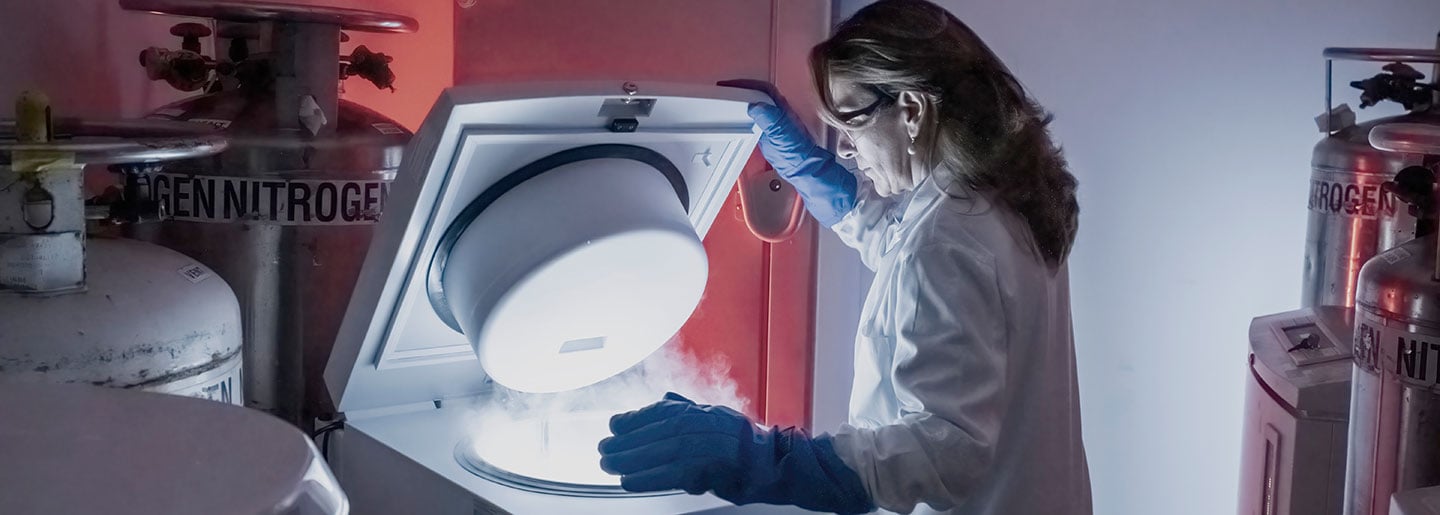
Immunotherapy
Immunotherapy is a type of treatment for lymphoma that boosts immune system function and helps it identify and destroy cancerous cells. Various types of immunotherapy have been studied and used for decades, but new therapies are constantly being developed and researched at Moffitt Cancer Center. Depending on a patient’s specific situation, immunotherapy may be used alone or in combination with other lymphoma treatment options. Both Hodgkin and non-Hodgkin lymphoma can be treated with immunotherapy.
Types of immunotherapy used for lymphoma treatment
Several different types of immunotherapy are effective for treating lymphoma. These include:
- Monoclonal antibodies – These antibodies work by binding to proteins found on the surface of cancerous cells. There, they can block cell growth, help the immune system locate cancerous cells that need to be destroyed or cause the cancerous cells to self-destruct. This was the first type of immunotherapy to be developed for lymphoma treatment, and one such drug (rituximab) is now considered to be a primary treatment option for B-cell lymphomas.
- Immune checkpoint inhibitors – These inhibitors work by helping the body’s T cells (immune system cells) recognize and destroy cancerous cells that might otherwise go undetected. Normal cells have a protein checkpoint that bonds with a paired protein on T cells, signaling the T cells not to attack. Cancer cells can mimic these proteins to trick the immune system into thinking they are healthy cells so they can avoid destruction. Inhibitors prevent these protein pairings from occurring so the T cells can correctly identify and attack lymphoma cells.
- Cellular immunotherapy – This treatment works by genetically modifying a patient’s own T cells so that they can more effectively recognize, target and destroy cancerous cells. One cellular immunotherapy option is chimeric antigen receptor (CAR) T cell therapy, which programs a patient’s T cells to recognize specific proteins that are present on lymphoma cells but not on healthy cells.
- Therapeutic cancer vaccines – These vaccines work by training the immune system to recognize and attack cells that carry tumor-specific antigens. Some options are administered subcutaneously (under the skin) or intravenously (into a vein), while others are delivered directly to a tumor. Lymphoma vaccines are currently only available through clinical trials.
Side effects of lymphoma immunotherapy treatments

The side effects of immunotherapy for lymphoma depend on what therapy is delivered and what type of lymphoma is being treated, and can vary from person to person as well. Some people have significant side effects while others have none at all. However, some of the most common side effects of immunotherapy include:
- Fatigue
- Fever
- Chills
- Coughing
- Muscle, joint and bone pain
- Headaches
- Nausea
- Vomiting
- Loss of appetite
- Diarrhea
- Constipation
- Skin rash
- Low blood cell counts
- Blood clots
- Nerve pain
- Dizziness
- Confusion
More serious side effects can also occur, including cytokine release syndrome (CRS), nervous system issues and severe infections.
Effectiveness of immunotherapy for treating lymphoma
Immunotherapy has been used to treat lymphoma for decades, and while it doesn’t work for every patient, it is effective in many cases. Almost all types of non-Hodgkin’s lymphomas are treated primarily with immunotherapies, while Hodgkin’s lymphomas are often treated in other ways first—patients may only receive immunotherapy if other options fail.
How immunotherapy compares to other lymphoma treatment options
As outlined above, immunotherapy works by helping the body’s own immune system find and destroy cancer cells. However, immunotherapy may be complemented by other treatments that work differently, such as:
- Chemotherapy – Powerful intravenous or oral medications destroy cancer cells systemically (throughout the whole body). Chemotherapy can be very effective for treating lymphoma, but it can also affect healthy cells, which may cause substantial side effects.
- Radiation therapy – Often combined with other therapies like chemotherapy, radiation therapy is used to target lymphoma cells that have accumulated in a particular area (such as in the lymph nodes) with high-energy X-rays. Radioimmunotherapy (RIT) combines immunotherapy and radiation therapy by using biological substances to deliver the radiation therapy directly to lymphoma cells.
- Stem cell transplant – Chemotherapy and radiation therapy can destroy healthy blood cells in addition to cancer cells, so sometimes stem cell transplants (also called bone marrow transplants) may be necessary to replenish healthy blood cells.
- Photopheresis – A type of photoimmunotherapy, photopheresis helps the immune system fight certain varieties of lymphoma as well as graft versus host disease, which can be caused by stem cell transplantation.
- Phototherapy – For early-stage cutaneous T cell lymphoma (which affects the skin), phototherapy is a promising treatment option. It uses ultraviolet (UV) light to destroy cancer cells on the skin.
- Surgery – While surgery is typically used to diagnose lymphoma rather than treat it, there are some instances where surgical resection (removal) of tumors is warranted.
When a physician may recommend immunotherapy for lymphoma
Whether—and when—a physician recommends immunotherapy for lymphoma treatment depends on the specific type of lymphoma, the stage of the disease and other factors. For some lymphomas, immunotherapies may be the first treatment. For other types, immunotherapies might be used in the case of a relapse (return of the disease after being considered cancer-free) or for refractory lymphomas (those that no longer respond to other treatments). There are over 70 types of lymphomas, so your oncology team will determine whether immunotherapy is the best course of treatment for your specific type.
Moffitt’s approach to immunotherapy for lymphoma
At Moffitt Cancer Center, our team is always investigating new treatments for lymphoma, including immunotherapies. As a National Cancer Institute-designated Comprehensive Cancer Center, we’re continually developing new ways to help the immune system recognize cancer cells and respond to them more effectively, giving patients a broader range of options for lymphoma treatment. For instance, we treated the first patient in the nation with KTE-C19 (a CAR T cell therapy) for aggressive non-Hodgkin lymphoma, and since then many more of our patients have benefited from this new therapy. This is just one example of our commitment to helping patients access cutting-edge therapies as soon as they become available.
To learn more about immunotherapy for lymphoma, call 1-888-663-3488 or submit a new patient registration form online. Our hematologists and oncologists can help you explore all of your potential treatment options. No referral is required.
References
Immunotherapy for Lymphoma - Cancer Research Institute
